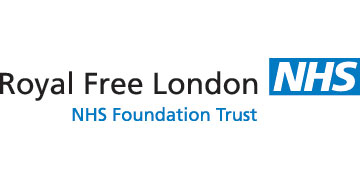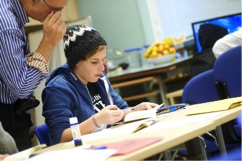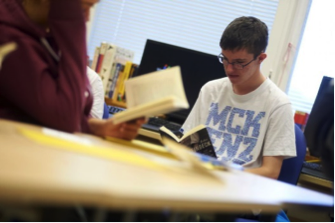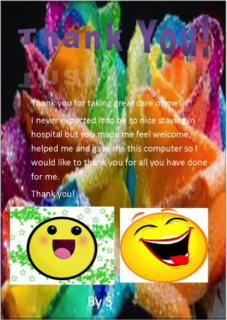 The Royal Free Hospital Children’s School (RFHCS) is a community Special School for pupils aged 5 to 16. It offers high quality education for all children who are inpatients at the Royal Free Hospital and for some children who are not inpatients but who are receiving support from medical or mental health services and may benefit from attending the school on a daily basis. The school operates within a multidisciplinary framework; working closely with a range of professionals including consultant doctors, mental health professionals, physiotherapists, speech therapists and other agencies.
The Royal Free Hospital Children’s School (RFHCS) is a community Special School for pupils aged 5 to 16. It offers high quality education for all children who are inpatients at the Royal Free Hospital and for some children who are not inpatients but who are receiving support from medical or mental health services and may benefit from attending the school on a daily basis. The school operates within a multidisciplinary framework; working closely with a range of professionals including consultant doctors, mental health professionals, physiotherapists, speech therapists and other agencies.
Alex Yates, Headteacher, introduced Multimedia Advocacy and Rix Wikis, to pupils and staff at the school in September 2104. The results have been extremely positive. Alex states:
“Multimedia Advocacy is a really effective way of using media to communicate the wants and needs of children and young people, especially those with a large number of professionals involved across a number of sectors. Multimedia advocacy shows that even the little things are important and each individual has the right to change something if they wish.”
Case study
Purpose
 What were your reasons for doing this development work?
What were your reasons for doing this development work?
- Building on research from UEL around effective pastoral planning and in response to new Code of Practice and the emphasis on CYP’s voice being placed at the centre of planning.
- There was also a need to codify and improve our own approach to planning around education, health and care.
How were you intending to improve pupil learning?
- Clearer sense of ownership of both academic targets and those related to personal development.
- It gives the student more power/control over their lives e.g. they make choices based on their own preferences.
- It is a great way of keeping everyone that supports an individual in the loop, but most importantly putting the individual child right at the centre of their own plans.
- It makes use of digital photography/ audio and video to organise thinking, reinforce memories, communicate preferences and viewpoints.
 Who were the identified target learners?
Who were the identified target learners?
- The target here is RFHCS Day School – generally outpatient referrals with significant medical and mental health challenges supported by large multi-agency teams. But the approach could be applied in any pastoral context.
What were your success criteria?
- Improved attendance.
- Improved engagement from multi-agency teams around the child.
- Pupils achieving relevant SMART targets.
- Parents/carers and other professionals engaging with the process.
What specific curriculum area did you intend to have impact on?
- All – including specific outcomes for individuals Post-16
Methodology
 What did you do – what teaching approaches did you use?
What did you do – what teaching approaches did you use?
- Two school ‘champions’ undertook a 12 week training programme then led group sessions with young people.
- The school utilised online ‘Wiki Sites’. Wikis are simple and accessible, private and secure easy-to-build personal websites. They can be used to create multimedia person-centred plans that use pictures, words, video and sound to capture the voice, skills, aspirations and needs of the individual. Wikis give ownership of the planning process to individuals and families, facilitating genuine collaboration between parents, teachers and professionals.
What specific teaching resources did you use?
- The online ‘Wiki Sites’ allowed pupils to build their portfolio in different ways, depending on the needs of an individual, for example: a curriculum vitae, a person-centred plan, health action plan, a support plan or a record of achievements.
What CPD experiences, materials, research and expertise have you drawn on?
- Rix Research & Media is a research and development centre based at the University of East London.
- Its expertise is in making IT and new media technologies bring real benefit to the learning disability community and beyond. Rix has been delivering Multimedia Advocacy training courses to education and care professionals for almost ten years and has worked with key education, health and care providers in the UK to help them improve their services.
- At RFHCS we focused particularly on Circles of Support, two stages, first is based on working with the Relationship Circle tool to identify existing people in the person’s life. The second stage is building on the existing Relationship Circle, identifying the gaps and actively finding ways of making new connections and more effective strategies for support.
Outcomes and Impact
What has been the impact on pupil learning?
- Builds IT skills and self-confidence
- Creates more effective support network that is focused on improving outcomes
- Improved opportunities for aspiring, learning and achieving.
Evidence of impact on pupil learning
- LAMS Reports (Looking at Myself and School)
- ECM Profile Data
- Learner Profile
- Year 11 Outcomes
What has been the impact on teaching?
- More transparent, child-centred practice.
Evidence of impact on teaching
- LSAs have developed technical skills and confidence that help them personally and professionally.
What has been the impact on school organisation and leadership?
Outcomes for staff:
- Gain wider knowledge of applications for IT and assistive technology in the SEN classroom
- Gain a new understanding of person-centred approaches and how to apply them in your practice
- Transition arrangements more robust
Evidence of impact on school organisation and leadership
- Very much In line with SEND policy and new legislation/reforms and Brian Lamb’s report
- Professional staff development linked to National policy objectives and reforms
- Develops your services with the latest methods and approaches
- Improves staff retention with meaningful learning and satisfying personal development
Sharing Practice
If another individual or school was attempting to replicate this work, where should they start?
Contact Rix Research & Media Coordinator at rixadmin@uel.ac.uk or on 0208 223 7561
What would be the essential elements to include?
Appoint school based champions to undertake the online Rix Wiki Builders Course in Multimedia Advocacy

